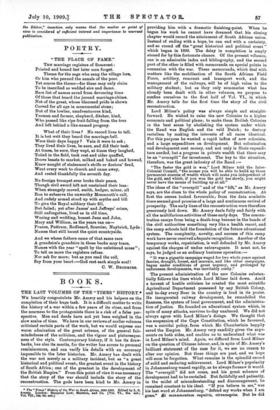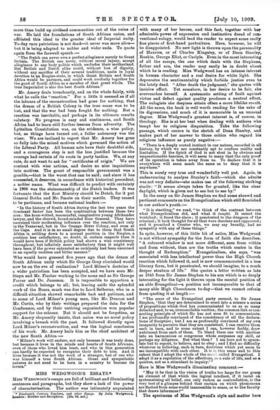BOOKS.
THE LAST VOLUMES OF THE " TIMES " HISTORY.* WE heartily congratulate Mr. Amery and his helpers on the completion of their huge task. It is a difficult matter to write the history of a war within a few years of its close, and from the nearness to the protagonists there is a risk of a false per- spective. Men and deeds have not yet been weighed in the slow scales of time. We have in our reviews of earlier volumes criticised certain parts of the work, but we would express our warm admiration of the great scheme, of the general fair- mindedness of the criticism, and the vigour and picturesque- ness of the style. Contemporary history, if it has its draw- backs, has also its merits, for the writer has access to personal reminiscences, and can verify his details with an accuracy impossible to the later historian. Mr. Amery has dealt with the war not merely as a military incident, but as "a great historical and political event; the greatest event in the history of South Africa; one of the greatest in the development of the British Empire." From this point of view it was necessary that the story of the war should include the story of the reconstruction. The gods have been kind to Mr. Amery in * The "Times History of the War in South Africa, 1899-1202. Edited by L. S. Amery. London: Sampson Low. Marston. and Co. [VOL VI., 21s. net ; Vol. VU., 10s. 68. net.]
providing him with a dramatic finishing-point. When he began his work he cannot have dreamed that his closing chapter would record the attainment of South African union. Instead of ending with a hope, he can end with a certainty, and so round off the "great historical and political event" which began in 1899. The delay in completion is amply atoned for by this fortunate chance. Of the present volumes, one is an admirable index and bibliography, and the second part of the other is filled with memoranda on special points in connexion with the war. These memoranda, which deal with matters like the mobilisation of the South African Field Force, artillery, remount and transport work, and the management of the railways, will be of high value to the military student; but as they only summarise what has already been dealt with in other volumes, we propose to confine ourselves to the first half of Vol. VI., in which Mr. A tnery tells for the first time the story of the civil reconstruction.
Lord Milner's policy was always simple and straight- forward. He wished to raise the new Colonies to a higher economic and political plane; to make them British Colonies in the best sense by abolishing the system under which the Rand was English and the veld Dutch ; to destroy racialism by making the interests of all races identical.
For this purpose he wanted a rapid influx of new colonists, and a large expenditure on development. But colonisation and development cost money, and not only is State expendi- ture needed, but a progress in private wealth that there may be an "overspill" for investment. The key to the situation, therefore, was the great industry of the Rand :—
"The faster the gold is won," Lord Milner told the Inter- Colonial Council, "the sooner you will be able to build up those permanent sources of wealth which will make you independent of the gold, and which, if you won the gold too slowly, you might never have the means of building up at all."
The ideas of the "overspill" and of the "lift," as Mr. Amery says, are the clues to the whole policy of reconstruction. At first the omens looked favourable; from the data available there seemed good promise of a large and continuous revival of prosperity. The early lines of the reconstruction were therefore generously laid down. Mr. Amery deals fully and fairly with all the multifarious activities of these early days. The concen- tration camps from being a death-trap became in the bands of the civil authorities something very like a health resort, and the camp schools laid the foundation of the future educational system. The complexity, novelty, and success of this camp work have never received adequate recognition. Another of the temporary works, repatriation, is well defended by Mr. Amery against the charges of undue extravagance. It must not, he says, be judged as an ordinary business operation :—
"It was a gigantic campaign waged for two whole years against famine, drought, locust, and murrain, and like other campaigns, begun under conditions of great urgency, and prolonged by unforeseen developments, was inevitably costly."
The present administration of the new Colonies substan- tially follows the lines which Lord Milner laid down. Amid a torrent of hostile criticism he created the most scientific Agricultural Department possessed by any British Colony, and to-day every Boer in the country is loud in its praise. He inaugurated railway development, he remodelled the finances, the system of local government, and the administra- tion of justice. He founded an educational system which, in spite of many attacks, survives to-day unaltered. We did not always agree with Lord Milner's doings. We thought that the suspension of the Cape Constitution, which he favoured, was a suicidal policy, from which Mr. Chamberlain happily saved the Empire. Mr. Amery very candidly gives the argu- ments on both sides, and enables us to understand what was in Lord Milner's mind. Again, we differed from Lord Milner on the question of Chinese labour, and, in spite of Mr. Amery 's brilliant statement of the ease for it, we see no reason to alter our opinion. But these things are past, and we hope will soon be forgotten. What remains is the splendid record of solid and enduring achievement. Lord Milner's popularity in Johannesburg waned rapidly, as he always foresaw it would. The "overspill" did not come, and his great schemes of development had to be curtailed. But faithfully and patiently, in the midst of misunderstanding and discouragement, he remained constant to his ideal. "If you believe in me," was his last word at Johannesburg, "defend my works when I am gone." Si monumentum requiris, eireumspice. But he did more than build up civilised communities out of the ruins of war. He laid the foundations of South African union, and affiliated this ideal to the greater ideal of Imperial unity. To-day race patriotism is not dead—it never was more alive— but it is being adapted to nobler and wider ends. To quote again from the farewell speech :—
" The Dutch can never own a perfect allegiance merely to Great Britain. The British can never, without moral injury, accept allegiance to any body politic which excludes their motherland. But British and Dutch alike could, without loss of dignity, without any sacrifice of their several traditions, unite in loyal devotion to an Empire-state, in which Great Britain and South Africa would be partners, and could work cordially together for the good of South Africa as a member of that great whole. The true Imperialist is also the best South African."
Mr. Amery deals trenchantly, and on the whole fairly, with what he calls the "reaction." For a little it seemed as if all the labours of the reconstruction had gone for nothing, that the dream of a British Colony in the true sense was to be lost, and that the war had been fought for nothing. But a reaction was inevitable, and perhaps in its ultimate results salutary. No progress is easy and continuous, and South Africa had to learn still further lessons from adversity. The
Lyttelton Constitution was, on the evidence, a wise policy, but, as things have turned out, a fuller autonomy was the wiser. We are inclined to regret that Mr. Amery has gone so fully into the mixed motives which governed the action of the Liberal Party. All human acts have their doubtful side, and a courageous step is not the less justified because the courage had certain of its roots in party tactics. We, at any rate, do not want to ask for "certificates of origin." We are content with wise actions, and desire no nice inquisitions into motives. The grant of responsible government was a gamble,—that is the worst that can be said; and since it has succeeded, it deserves, in accordance with historical precedent,
a nobler name. What was difficult to predict with certainty in 1906 was the statesmanship of the Dutch leaders. It was fortunate that the first Ministry should be Dutch, for it put General Botha and Mr. Smuts on their mettle. They ceased
to be partisans, and became national leaders :—
"In the history of South Africa during the last two years the dominant factor has been the combination between these two men: the keen-witted, resourceful, imaginative young Afrikander lawyer, and the shrewd, broad-minded Boer General. They have exercised their moderating influence over the reaction, not only in the Transvaal, but in the Orange River Colony, and even at the Cape. And it is in no small degree due to them that South Africa is settling down to a normal position in the Empire, a position less satisfactory, no doubt, in certain respects than it would have been if British policy had shown a wise consistency throughout, but infinitely more satisfactory than it might well have been if the power entrusted so recklessly had been exercised in an equally reckless and bitter manner."
Who would have guessed five years ago that the dream of South African unity which Sir George Grey cherished would now be on the eve of realisation? Lord Miler's doctrine of a wider patriotism has been accepted, and we have seen Mr.
Steyn and Mr. Fischer working to the same end as Sir George Farrar and Dr. Jameson. It is impossible to apportion a
credit which belongs to all; but, leaving aside the splendid work of the Boers, much was due to Lord Selborne, who in a difficult situation showed remarkable tact and patience, and to some of Lord Milner's young men, like Mr. Duncan and Mr. Curtis, who by their writings prepared the data for the Conference, and by their untiring organisation won popular support for the scheme. But it should not be forgotten, as Mr. Amery eloquently insists, that union was no novel policy involving a breach with the past. It followed directly upon Lord Milner's reconstruction, and was the logical conclusion of his work. Mr. Amery hails him as the chief architect of the new South Africa :—
" 31:Hiner's work will endure, not only because it was truly done, but because it lives in the minds and hearts of South Africans, even of those who loved him least, and who in this generation can hardly be expected to recognise their debt to him. And it lives because it was not the work of a stranger, but of one who was himself a true South African. Great and sympathetic natures do not need to be born in a country to become its lovers."











































 Previous page
Previous page